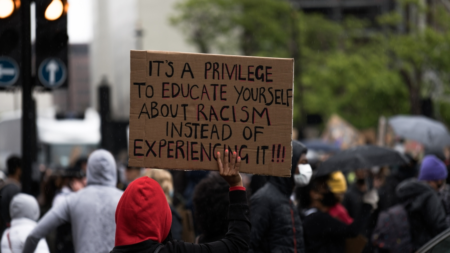By Scot Loyd
In a world marred by centuries of systemic racism and oppression, the call for change has never been louder. Racism, deeply ingrained in societal structures, has caused immeasurable harm to communities of color. As we strive for a more just and equitable society, it’s crucial for white individuals to recognize their role in perpetuating systems of white supremacy and to take concrete actions to dismantle them.
The notion of simply “hugging it out” is not enough to address the deep-rooted issues of racism. While expressions of empathy and understanding are important, they must be coupled with tangible efforts to effect real change. It’s time for white folks to step up, acknowledge their privilege, and actively work towards dismantling systems of oppression.
Here are some actionable steps for white individuals to begin this essential work:
- Educate Yourself: Take the initiative to educate yourself about the history of racism and its impact on marginalized communities. Read books, listen to podcasts, watch documentaries, and engage with diverse perspectives. Understanding the root causes and manifestations of racism is essential in order to effectively combat it.
- Listen and Amplify: Practice active listening to the experiences and perspectives of people of color. Create space for their voices to be heard and amplify their messages. Resist the urge to center the conversation around your own experiences, and instead, uplift the voices of those who have been marginalized.
- Challenge Your Own Biases: Reflect critically on your own beliefs and attitudes towards race. Recognize that everyone, regardless of their intentions, has been socialized in a society that perpetuates racism. Challenge yourself to identify and confront your own biases, and be open to learning and growth.
- Speak Up: Use your privilege and platform to speak out against racism and injustice. Don’t stay silent in the face of discrimination or microaggressions. Whether it’s in your workplace, social circles, or online communities, be an advocate for change and use your voice to call out harmful behavior.
- Support Anti-Racist Organizations: Take action by supporting organizations and initiatives that are actively working to combat racism. Whether through donations, volunteer work, or advocacy, contribute your resources to support grassroots efforts for racial justice.
- Engage in Difficult Conversations: Have honest and courageous conversations with other white individuals about racism and privilege. Don’t shy away from discomfort or conflict; instead, lean into these conversations as opportunities for growth and understanding. Be willing to listen, learn, and challenge each other to do better.
- Hold Yourself Accountable: Recognize that dismantling racism is a lifelong commitment that requires continuous effort and self-reflection. Hold yourself accountable for your actions and be willing to course-correct when necessary. Acknowledge when you make mistakes, apologize sincerely, and strive to do better moving forward.
- Take Action in Your Community: Get involved in local initiatives and organizations that are working to address racial disparities in your community. Whether it’s participating in protests, advocating for policy changes, or supporting community-led initiatives, there are countless ways to make a difference at the grassroots level.
- Commit to Allyship: Understand that being an ally is not just a one-time action, but an ongoing commitment to supporting and advocating for marginalized communities. Educate yourself about what it means to be an effective ally, and actively work to dismantle systems of oppression in solidarity with those who are directly impacted.
- Empower Others: Use your privilege to empower and uplift individuals and communities of color. Advocate for inclusive policies and practices in your workplace, support diverse talent and leadership, and actively work to create opportunities for marginalized voices to be heard and valued.
Addressing racism requires more than just surface-level gestures or empty promises. It demands a genuine commitment to challenging systems of oppression and actively working towards a more equitable society. As white individuals, we must confront our own complicity in perpetuating racism and take meaningful action to dismantle it. It’s time to lay down our notions of white supremacy, repent for the harm that has been caused, and actively work toward a future where justice and equality are a reality for all.


